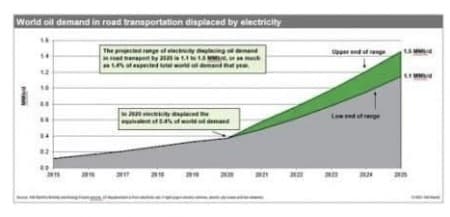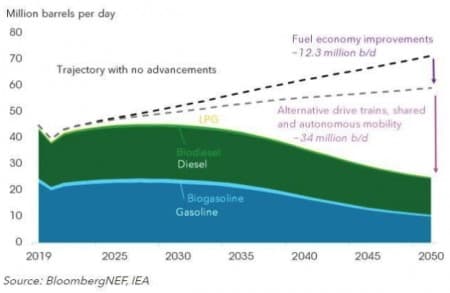Back in August, President Joe Biden came out with an executive order aimed at making half of all new vehicles sold in 2030 electric (battery electric, fuel cell and plug-in hybrid vehicles). The move was part of Biden's plan to fight climate change, in this case by targeting emissions from cars and trucks.
Surprisingly, the three leading Detroit automakers General Motors (NYSE:GM), Ford (NYSE:F), and Chrysler parent Stellantis N.V. (NYSE:STLA)--formerly Fiat Chrysler–issued a joint statement supporting Biden's ambitious plan.
Never mind the fact that EVs made up a mere 1.7% of all new vehicle sales in 2020. Meanwhile, Biden's new $1 trillion infrastructure bill provides just $7.5 billion in federal grants to build a national network of charging stations, half of what Biden had earlier pledged to build 500,000 charging stations across the country.
But it appears that the EV revolution is not waiting for anybody.
According to a report by the Korea Automotive Technology Institute (KAII), global EV sales have exceeded 3 million units in the first three quarters of 2021, a run rate that puts it on course to break 4 million units a year for the first time ever. BloombergNEF is even more optimistic, and expects global sales of electric passenger vehicles this year to clock in at 5.6 million units, good for an impressive 8% of new vehicle sales.
China remains, by far, the biggest buyer of electric vehicles, with 1.76 million units sold in the country during the period.
The United States comes in a distant second with 272,554 units followed by Germany 243,892 units; UK 131,832 units; France 114,836 units; and Norway 84,428 units.
EV sales accounted for 9.4% of new vehicle sales in China but just 2.3% in the USA.
On a company basis, Tesla Inc. (NASDAQ:TSLA) remains the most popular model after moving 625,624 units; China's SAIC Motor sold 413,037 units; Volkswagen 287,852 units; and China's BYD Corp. (NYSE:BYD) with 189,751 units.
Nixing oil demand
Obviously, oil and gas investors will receive the latest revelation with a bit of trepidation considering that EVs are seen as the arch-nemesis of the sector.
But how much threat does the EV revolution pose for the fossil fuel sector?
A report from IHS Markit shows that last year, light plug-in and fuel-cell vehicles, as well as electric city buses and two-wheelers, collectively displaced about 370,000 barrels per day of global oil consumption, a figure that is projected to grow to 1.5 million barrels per day by 2025, equal to about 1.4% of the projected level of total world oil demand.
Certainly does not appear worth losing sleep over by long-term oil investors.

Source: IHS Markit
Electrifying America's vehicles is a critical part of combating climate change, considering that the transport sector accounts for 21% of total GHG emissions. But has not been happening fast enough. Bloomberg New Energy Finance (BNEF) has projected that EVs will account for ~8% of the global fleet by 2030 and reach 31% of the global fleet by 2040. The new energy research provider also says that it will take at least two decades for EV sales to hit 60% of all new vehicle sales.
As Dean Foreman, chief economist at the American Petroleum Institute, has quipped: "EVs can "eat into traditional market share for liquid fuels, but that's largely a developed economy, or rich country issue at this point."
Bloomberg New Energy Finance estimates that road fuel oil demand will peak in 2027, but it will take another decade for the impact of advancements to be materially felt. Emissions will almost halve by 2050, but the sector will still be nowhere near net zero. In the best case scenario, by the 2050s, fossil-derived road fuel demand will fall below levels last seen in the early 1970s. In this case, oil-related emissions will drop to 3.4 gigatons CO2 by 2050, down from almost 6.5Gt in 2019.
However, the latest EV report suggests that the transition from ICEs to EVs is happening at a faster-than-expected clip and could soon elicit a new round of bearish projections by Wall Street for the long-suffering oil and gas sector.

Source: Bloomberg
By Alex Kimani for Oilprice.
More Top Reads From Oilprice.com:
- Metals Will Be The Oil Of The Future
- Saudi Prince Lashes Out At Greenpeace During COP26
- Will A Strategic Petroleum Release Bring Down U.S. Gasoline Prices?



















Ouch!
Plus Brightline as well (fully private.)
You can ship your car on Amtrak to Florida...a really good deal if you want to sell that vehicle in Florida.
Anyhow it's "green hydrogen" that is displacing not just oil but lead acid batteries in a *HUGE* way at the moment...along with the North American Railroad Network.
Even really efficient ICE Platform vehicles like the Volkswagen Golf or Ford Maverick and upcoming Ford Ranger are going to be a huge problem for purveyors of fleecing at the gasoline pump.
Obviously US electricity prices have not nearly risen so much as fuel prices have...and if you're using a Tesla *PowerWall* plus solar you're hardly using any electricity at all at the moment.
Long $nee Next Era Energy
Strong buy
This issue, hidden for now by the media, is going to come to public consciousness, changing the overall perspective on EV's .....
At the same time, the current lithium, cobalt, and nickel mining operations are going to begin approaching exhaustion. New mines will require extensive environmental impact studies and permitting, and so we will start hearing about the issues of how damaging these mines are and how dangerous are the tailings. This won't be too helpful either.
Moreover, there will be a need for investing a few trillions of dollars in expanding the global electricity generation to accommodate a few millions of EVs and another trillion to establish charging points around the globe.
The quintessential question is how the global electricity expansion be sourced: solar, nuclear or by hydrocarbons.
Dr Mamdouh G Salameh
International Oil Economist
Visiting Professor of Energy Economics at ESCP Europe Business School, London